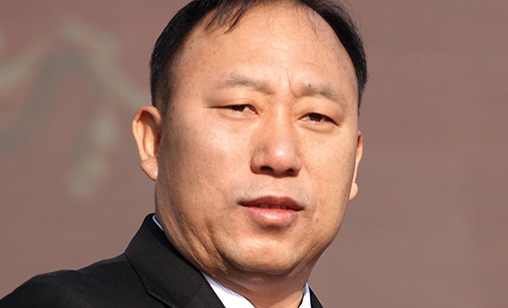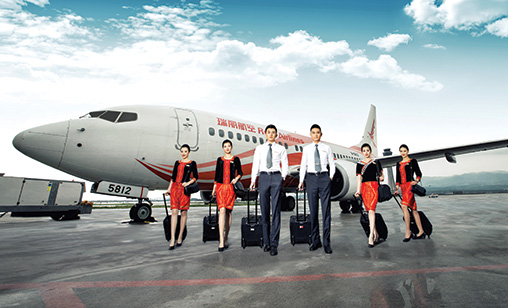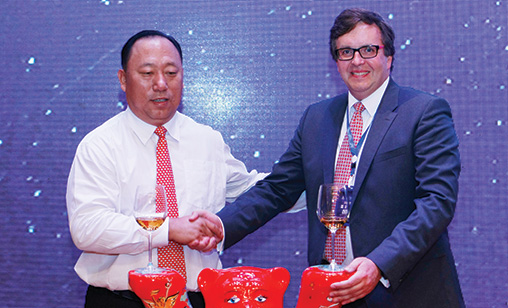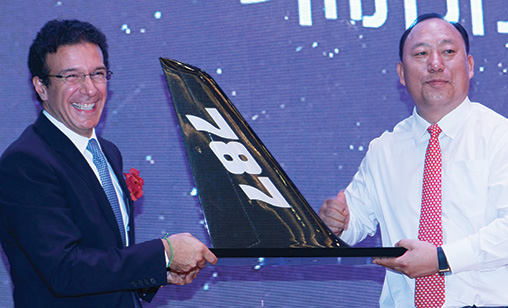Executive Interview
The ruler of Ruili Airlines
Dong Lecheng, the chairman of Ruili Airlines, began his working life at 19, selling vegetables by the roadside. Three decades later, he runs a US$1 billion conglomerate that includes full service economy carrier, Ruili Airlines. Last month, Orient Aviation Greater China correspondent, Dominic Lalk, was a guest at the airline’s second anniversary celebrations in south western Yunnan.
June 1st 2016
Travelling to Ruili is difficult. From Hong Kong, Orient Aviation flew to Kunming, Yunnan’s capital city, then onto Mangshi, the capital of Dehong prefecture deep in the Mainland’s southwest. Read More » After 45-minute drive on a newly-built, mountainous and empty highway, Ruili, China’s largest border town with Myanmar, appeared on the horizon.
 |
| Dong Lecheng Chairman Ruili Airlines |
A few hours later, in a city of Han Chinese, Burmese and local ethnic minorities such as the Dais, the Jingpo and De’ang, Orient Aviation was introduced to Dong Lecheng, 47, the chairman of Yunnan JingCheng Group and Yunnan’s third richest man, to discuss his latest business venture, domestic carrier, Ruili Airlines.
“Ruili is China’s great border town, and what a border it is: between new and old, controlled and unrestrained, a tidy but tawdry town China considers both a dirty little secret and also a promising new tourist destination,” TIME magazine said when it visited the city at the turn of the century, uncovering a flourishing trade in drugs, sex, and jade, and widespread money laundering at local casinos.
In the midst of the colour and chaos of Ruili, Dong Lecheng, grew up and rose to local fame and status. He is said to be Yunnan’s third wealthiest man.
Dong was receiving guests in a spa villa at one of his Ruili hotels on the eve of his airline’s second anniversary. Dressed in a genuine Louis Vuitton T-shirt, signature Hermes belt, shorts and trainers, the chairman announced he was looking forward to the first visit of an overseas aviation journalist and then offered your correspondent the first of many “yun yan 99” cigarettes.
Dong is rarely spotted without a “99”. Whenever he finishes a pack, someone in his all-male entourage of close aides and senior managers were on hand with more.
The Ruili of the TIME article has passed. The crackdown against corruption by the present Chinese leadership has had an impact on some of its excesses and Dong and his team are set on a path for Ruili Airlines that is much more visitor friendly.
They have mapped out a strategy to put Yunnan on the world map, with Kunming to be developed into southwest China’s gateway to the world.
Kunming’s Changshui International Airport, which opened in 2012, served 37 million passengers in 2015 and it expects to handle 45 million by 2020. Claimed to be China’s fourth largest airport terminal, it has a design capacity of 70 million passengers that is served by four runways of which two are operational. The Yunnan government offers subsidies to any airline that starts international routes.
With start-up capital of 600 million yuan ($91.6 million) from Dong’s JingCheng group and an additional 100 million yuan in government subsidies, Ruili obtained its Air Operator’s Certificate (AOC) from the Civil Aviation Administration of China (CAAC) in May 2013 after an unusually short wait of six months.
Dong said the carrier was the first airline to be granted a new AOC since 2007 after the regulator stopped issuing new permits amid overcapacity and a slowing global economy.
 |
| 'Ruili Airlines’ key challenge to date is a cockpit crew shortage. China has an acute shortage of pilots and crew transfer is made difficult by complicated bureaucracy and a five million yuan ($764,000) fine for intra-carrier transfers. The airline’s cockpit crew is made up of former China Eastern Airlines and China Southern Airlines crew and some South Korean pilots' |
In the lead-up to its AOC, Ruili engaged Pacific China Aero Technology Ltd, a Greater China Consultancy, to source its first aircraft. Pacific China Aero introduced Ruili Airlines to airberlin, which marked the beginning of a strong relationship that has continued to flourish.
Ruili purchased two B737-700s from the German carrier and it was with these two aircraft that it commenced commercial operations on May 18, 2013, with a flight from Kunming to Mangshi. Ruili Airlines now has nine aircraft – six B737-700s and three -800s. All but one of the planes were formerly owned by airberlin.
The carrier provided the first hint of its ambitions in August 2015 when it signed an agreement with Boeing, AVIC Leasing and Minsheng Financing for 30 B737 MAX aircraft, made up of MAX 8 and 9 variants, plus 30 options. The B737 MAXs won’t arrive in Yunnan before 2020.
But Dong, his airline’s CEO, Ma Zhanwei, and general manager, Xie Jinguo, told Orient Aviation that Ruili Airlines had previously signed a deal with Boeing for 14 B737NGs to support its short- and medium-term fleet growth. “We expect to receive at least four new aircraft every year,” Dong said.
“The airberlin deal introduced the B737 to us. We like this plane,” the chairman said. “We should really be sending a commission invoice to Boeing for introducing the 737 to Ruili,” a senior airberlin executive joked on the sidelines of the anniversary festivities.
At its second anniversary celebrations, Ruili announced it had signed a Memorandum of Understanding for six B787-9 Dreamliners that also were financed by AVIC leasing. With deliveries scheduled from 2019 to 2021, Ruili wants to launch its long-haul operations with the B787. Chinese regulations require airlines to be in business for at least three years before they can commence international services.
At press time, Ruili Airlines was flying to 20 cities across twelve provinces and two municipalities with 46 daily flights. The carrier’s network has expanded gradually to cover the majority of China’s first and second-tier metropolises, although its presence is still noticeably weak in the south and east, with Guangzhou, Shenzhen, Xiamen, Shanghai, Ningbo, Hangzhou and, remarkably, Beijing still missing from its network.
As Ruili Airlines continues to receive new B737s, its reach will expand to include all major Mainland second and third-tier cities, Dong said.
The carrier plans to use the Dreamliners to fly to Australia, Europe, the U.S., and regionally to Thailand and Singapore. “I like the B787,” Dong said. He added he would order more and that Boeing was an obvious choice for the carrier’s long-haul fleet because of commonalities with its B737 fleet and the savings that produced for MRO and training.
When asked if he had considered Airbus’ A350, Dong said he preferred U.S.-built airliners. “I trust Boeing,” the chairman exclaimed “because there is too much automation in Airbus planes.” He likes his pilots to fly manually. Too much automation can distract them, he said. His home airport in Mangshi does not have an ILS and is regularly affected by morning fog, which could explain some of Dong’s thinking.
When Ruili Airlines was launched, it counted 16,595 revenue passenger boardings in its first month of operations. The numbers grew to 72,655 passengers after six months and 106,880 on its first anniversary. It is aiming for 160,000 passengers this month.
 |
 |
The carrier’s load factor since inauguration has consistently hovered above 85%, with figures in the first five months of 2016 exceeding 90%. In April, Ruili said it had $16.6 million in revenue or approximately $107 per passenger not accounting for expenses.
The airline has not yet made a profit, but “that will change soon,” said Dong. “After inducting the two latest airberlin 737s into the fleet on May 26, we will start making profits in June.”
He is not worried about competition, despite the fact that Lucky Air (HNA Group), Kunming Airlines (Shenzhen Airlines) and China Eastern Airlines’ southwest branch are being based in Changshui. In late May, Hongtu Airlines joined the crowd when it started domestic operations with a pair of A321s. Hongtu Airlines is a joint venture between Kunming Evergreen Financing (30%) and local tycoon, Tang Longcheng (20%), with the remaining 50% held by a consortium of five local firms.
Dong said Ruili Airlines’ key challenge to date was a cockpit crew shortage. China has an acute shortage of pilots, he said, and crew transfer is made difficult by complicated bureaucracy and a five million yuan ($764,000) fine for intra-carrier transfers. The airline’s cockpit crew is made up of former China Eastern Airlines and China Southern Airlines crew and some South Korean pilots.
To address the problem, Ruili Airlines is looking for Yunnan partners to build its own flight training school and establish a cadet pilot program – with this August as the planned starting date for its development. Once it is established, Dong hoped to attract cadets from neighbouring countries, particularly Myanmar, to the training school. The carrier also is building a new headquarters, including crew dormitories, adjacent to Changshui airport.
Ruili Airlines, which does not have a frequent flyer program or an English website, said it won’t be joining an alliance, nor will it form one. Dong believed they created an uneven playing field with the larger partners often exploiting the smaller players. That said, he told Orient Aviation Ruili is looking at an “informal partnership” with Colourful Guizhou Airlines and Xiamen Airlines.
When the first B787 is delivered in 2019, the airline will offer a two class service, business and economy, on the airliners. At present, it is a full-service all economy class domestic carrier. “We cannot sell first class because the government has ordered its cadres to fly domestic economy,” Dong explained, and added he does not think Beijing will change this policy for the next decade.
As the carrier grows, it may launch its own low-cost carrier, Dong said, although no plans have been mooted for now. Instead, the Ruili chairman is toying with launching a dedicated cargo carrier. Ideas he is considering are collaborations with internet giants, Alibaba and Huawei. “I will present this plan to the government later this year,” he said.
Dong already has a general aviation company, Dehong South Asian Airlines, which operates out of JingCheng Heliport in Ruili, the largest general aviation airport in southwest China. Dehong South Asian Airlines has a 28-seater Boeing Business Jet, which the chairman regularly uses on his business trips, as well as renting it out for charter flights, plus two Sikorsky S92s and a Sikorsky-76D helicopter.
“I like business. And I like challenges,” Dong said. All he could think about when he was 19 was how to make money and grow it. Living in a large family with a lot of siblings, life was tough for Dong so he decided to quit school. Leaving the mountains of his home behind he began his entrepreneurial career. “My parents were farmers and didn’t have any resources so I opened a small roadside grocery store and took my chances,” he said. Soon afterwards, he started trading Chinese herbs and medicine across the border.
Dong must have been a shrewd trader. Less than four years later, in 1990, aged 23, he founded the JingCheng Group, now a $2 billion conglomerate with holdings in construction, mining, real estate, tourism and manufacturing.
“Eventually, I want to have at least three listed companies,” Dong said, including a car manufacturing business and a bank. Nevertheless, the chief said he is “not talented” and he considers himself “lucky” because he came across “a lot of opportunities” in life.
Hailed as “the first businessman of the Jingpo ethnicity”, Dong said he does “a lot of good things” for the community, including the creation of the Dong Lecheng fund that supports 50 sick, elderly and homeless Dehong citizens, as well as providing jobs at his many businesses.
The JingCheng boss lives a busy and colourful life, but he wouldn’t want it any other way. “I like to work and I feel restless when I’m not conducting business,” he said. He very rarely takes a holiday and intends to continue this lifestyle until his planned retirement at 60, when he will hand the business over to his eldest son.